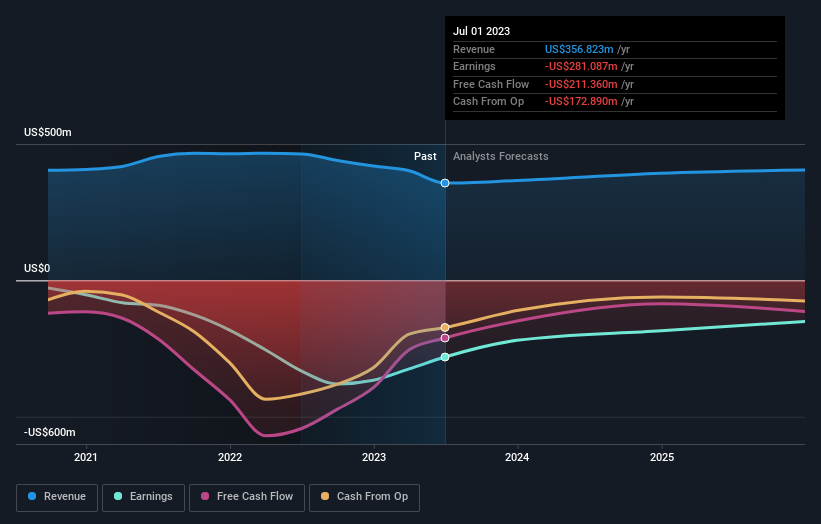Beyond Meat, Inc.'s (NASDAQ:BYND) recent 10% pullback adds to one-year year losses, institutional owners may take drastic measures
Key Insights
Given the large stake in the stock by institutions, Beyond Meat's stock price might be vulnerable to their trading decisions
A total of 25 investors have a majority stake in the company with 49% ownership
Using data from analyst forecasts alongside ownership research, one can better assess the future performance of a company
A look at the shareholders of Beyond Meat, Inc. (NASDAQ:BYND) can tell us which group is most powerful. The group holding the most number of shares in the company, around 49% to be precise, is institutions. Put another way, the group faces the maximum upside potential (or downside risk).
And institutional investors endured the highest losses after the company's share price fell by 10% last week. The recent loss, which adds to a one-year loss of 49% for stockholders, may not sit well with this group of investors. Often called “market movers", institutions wield significant power in influencing the price dynamics of any stock. As a result, if the decline continues, institutional investors may be pressured to sell Beyond Meat which might hurt individual investors.
In the chart below, we zoom in on the different ownership groups of Beyond Meat.
Check out our latest analysis for Beyond Meat
What Does The Institutional Ownership Tell Us About Beyond Meat?
Institutional investors commonly compare their own returns to the returns of a commonly followed index. So they generally do consider buying larger companies that are included in the relevant benchmark index.
As you can see, institutional investors have a fair amount of stake in Beyond Meat. This suggests some credibility amongst professional investors. But we can't rely on that fact alone since institutions make bad investments sometimes, just like everyone does. It is not uncommon to see a big share price drop if two large institutional investors try to sell out of a stock at the same time. So it is worth checking the past earnings trajectory of Beyond Meat, (below). Of course, keep in mind that there are other factors to consider, too.
We note that hedge funds don't have a meaningful investment in Beyond Meat. The Vanguard Group, Inc. is currently the company's largest shareholder with 9.7% of shares outstanding. In comparison, the second and third largest shareholders hold about 8.4% and 6.5% of the stock. Furthermore, CEO Ethan Brown is the owner of 2.3% of the company's shares.
A deeper look at our ownership data shows that the top 25 shareholders collectively hold less than half of the register, suggesting a large group of small holders where no single shareholder has a majority.
While it makes sense to study institutional ownership data for a company, it also makes sense to study analyst sentiments to know which way the wind is blowing. There are plenty of analysts covering the stock, so it might be worth seeing what they are forecasting, too.
Insider Ownership Of Beyond Meat
While the precise definition of an insider can be subjective, almost everyone considers board members to be insiders. The company management answer to the board and the latter should represent the interests of shareholders. Notably, sometimes top-level managers are on the board themselves.
Most consider insider ownership a positive because it can indicate the board is well aligned with other shareholders. However, on some occasions too much power is concentrated within this group.
We can see that insiders own shares in Beyond Meat, Inc.. In their own names, insiders own US$29m worth of stock in the US$662m company. It is good to see some investment by insiders, but it might be worth checking if those insiders have been buying.
General Public Ownership
With a 42% ownership, the general public, mostly comprising of individual investors, have some degree of sway over Beyond Meat. This size of ownership, while considerable, may not be enough to change company policy if the decision is not in sync with other large shareholders.
Private Company Ownership
We can see that Private Companies own 4.4%, of the shares on issue. Private companies may be related parties. Sometimes insiders have an interest in a public company through a holding in a private company, rather than in their own capacity as an individual. While it's hard to draw any broad stroke conclusions, it is worth noting as an area for further research.
Next Steps:
It's always worth thinking about the different groups who own shares in a company. But to understand Beyond Meat better, we need to consider many other factors. Like risks, for instance. Every company has them, and we've spotted 4 warning signs for Beyond Meat (of which 1 is potentially serious!) you should know about.
If you would prefer discover what analysts are predicting in terms of future growth, do not miss this free report on analyst forecasts.
NB: Figures in this article are calculated using data from the last twelve months, which refer to the 12-month period ending on the last date of the month the financial statement is dated. This may not be consistent with full year annual report figures.
Have feedback on this article? Concerned about the content? Get in touch with us directly. Alternatively, email editorial-team (at) simplywallst.com.
This article by Simply Wall St is general in nature. We provide commentary based on historical data and analyst forecasts only using an unbiased methodology and our articles are not intended to be financial advice. It does not constitute a recommendation to buy or sell any stock, and does not take account of your objectives, or your financial situation. We aim to bring you long-term focused analysis driven by fundamental data. Note that our analysis may not factor in the latest price-sensitive company announcements or qualitative material. Simply Wall St has no position in any stocks mentioned.

 Yahoo Finance
Yahoo Finance 

